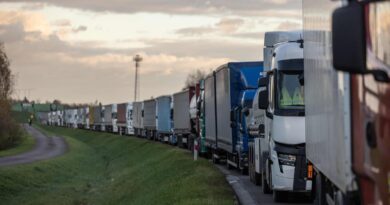Climate Change Committee demands net zero leadership
Press play to listen to this article
Voiced by artificial intelligence.
— The Climate Change Committee released its annual progress report to parliament overnight. It is a hefty document and we have all the details.
— The government says the U.K. can be “proud” of its climate record, while Labour says the report is evidence of “catastrophic negligence.”
— In non-CCC news, Business and Trade Secretary Kemi Badenoch says that a long-term plan for the automotive sector is coming next month.
Good Wednesday morning and welcome to POLITICO Pro Morning Energy and Climate UK. It’s the middle of the week and we have a packed newsletter to celebrate — thank the CCC.
As always, please send your thoughts and tips to one or all of us at [email protected], [email protected] and [email protected]. Or talk to us on Twitter: @hargraver; @charliecooper8; @abby_wallace3.
If you are not already a Pro subscriber and would like a free trial of this newsletter, sign up here.
CCC PROGRESS REPORT: In March this year, the U.K. government — nudged by the courts — showed its climate hand. The “Green Day” announcements presented in great detail — 3,000 pages all told — how Rishi Sunak and his ministers plan to hit the U.K.’s legally-mandated climate targets. It was a welcome act of transparency. The only problem? The government’s own official adviser is not convinced.
In fact … says the Climate Change Committee (CCC) in its 15th annual progress report to parliament, published this morning: “Our confidence in the achievement of the U.K.’s 2030 target and the fifth and sixth carbon budgets has markedly declined from last year.”
Marked down: Yup, that’s right — they saw the full plan and they’re even more concerned than before. Speaking to journalists ahead of the report’s launch, CCC Chief Executive Chris Stark said: “In a year when the government has published more detail on its climate plans than ever before, we think it’s less likely than last year that the U.K. will hit its future legal goals. That’s very worrying for us and that’s the main lesson for our assessment this year.”
Emissions update: U.K. greenhouse gas emissions in 2022 were at 450 million tons carbon dioxide equivalent, including international aviation and shipping. That’s an increase of 0.8 percent since 2021, but still 9 percent below pre-pandemic levels and 46 percent below 1990 levels. The report says emissions cuts will have to “significantly increase” if the U.K. is to hit its “nationally determined contribution” to climate action — agreed at COP26 — of 68 percent below 1990 levels by 2030. In fact, outside the electricity sector, reductions will have to nearly quadruple from an average of 1.2 percent per year to 4.4 percent per year.
Leader no more: The report said that slow progress against the targets, combined with “backtracking” on fossil fuel commitments (think a Cumbria coalmine and a new oil and gas licensing round), had cost the U.K. its “clear global leadership position” on climate change. More from Charlie and Abby here.
Sad Gummer’s goodbye: This is the final annual report to be published under the stewardship of CCC chair John Gummer (or Lord Deben to those not bound by U.S. journalistic style rules.) The former Conservative environment secretary said he was “sad” that his swan song had to be so gloomy. Speaking to reporters ahead of its publication, he said he hoped the “tough and clear” message would prompt the government to put climate change back at the center of its agenda.
Coda: “Everything that we hold most dear is threatened by climate change,” Gummer said. “Urgency is the word that we have to hang on to all the time. We really can’t let these chances go because they won’t come again — and our children and grandchildren will ask us how it was that we let them down.”
GOVERNMENT RESPONSE: To be fair, it would take a while to respond to everything in the report. For now, a government spokesperson insisted the country could still be “proud” of its “record as a world leader on net zero” adding: “The U.K. is cutting emissions faster than any other G7 country and attracted billions of investment into renewables, which now account for 40 per cent of our electricity.”
Labour lets rip: The Opposition’s Shadow Climate and Net Zero Secretary Ed Miliband was predictably scathing, calling the report evidence of “catastrophic negligence” from ministers and “by some distance the most damning indictment of a government since the CCC was established in 2008.” Oof.
AND THERE’S MORE: Readers, this is merely a summary of the CCC’s main points. We dive deeper into the details at the bottom of this email.
FUSION FORUM: Energy Secretary Grant Shapps is speaking at the Science Superpower Conference in London today, where he will focus on the importance of fusion technology in boosting energy security.
ROSEBANK LATEST: Green Party MP Caroline Lucas will lead a Westminster Hall debate at 11 a.m on the environmental impact of the Rosebank oil field. A decision on approving a license for drilling at Rosebank, one of the largest untapped oil fields in the North Sea, could come within weeks.
GBN UPDATE: Also in Westminster Hall, Virginia Crosbie — the Ynys Môn MP once nicknamed “atomic kitten” by Boris Johnson at Prime Minister’s Questions over her enthusiasm for nuclear power — has a debate on Great British Nuclear at 4 p.m.
Speaking of PMQs … It’s happening at noon and Sunak may be grilled on the CCC report. Team MECUK will keep our eyes and ears peeled.
MEET THE MPs: MPs on the newly-minted energy security and net zero select committee start their work in earnest today with a get-together in parliament for industry bods. The committee says the stakeholder event will help “set its priorities and program of work.”
Tell us more: Sadly the committee couldn’t provide MECUK with a guest list or agenda — so if you are at the event and want to tell us what was discussed over the olives and warm white wine, drop us a line.
**A message from SSE: Want to become a clean energy superpower and accelerate the transition to net zero? Then now is the time to be bold on carbon capture. We’re ready to go. Are you? Find out more.**
KEMI SAYS: The government will set out a plan to boost U.K. domestic manufacturing, particularly within the automotive sector, in July. So said Business and Trade Secretary Kemi Badenoch Tuesday.
An IRA response? Speaking at the Society of Motor Manufacturers and Traders (SMMT) conference, Badenoch said the U.K. would not “copy and paste” what is planned under the U.S. Inflation Reduction Act (IRA) but would set out its own “long-term plan.”
GREEN INVESTMENT STOCK TAKE: Speaking of which, Cleantech for U.K. — an investor coalition that won the Rishi Sunak seal of approval at its launch earlier this year — has published a report on investment in the U.K. The good news is that the country set a record for investment in clean tech in 2022 of £2.8 billion. The bad news is that the U.K.’s market size disadvantage compared to the U.S., the EU and China will be “further compounded” if the country “fails at delivering an equivalent” to the IRA or the EU’s Green Deal.
BATTERY BUSES: More than 5,800 additional green buses are needed by 2030 in English regions outside London to reach net zero, according to a new report from the Institute for Public Policy Research.
TOYOTA TROUBLE: The car manufacturer has been slapped on the wrist by the U.K. advertising watchdog over an EV advertisement from 2022. Toyota claimed its bZ4X model SUV could use rapid public charging to power-up in around 30 minutes, only indicating further down the page that this depended on “local circumstance.” Toyota did not make that latter point entirely clear, the Advertising Standards Authority decided.
**Our Product Team is exploring decisive advancements to our Pro offering and would love to get your input! Book a conversation slot with them that works best for you.**
WELCOME BACK: So, about that CCC report …
PLANS PLEASE: The committee recommended a host of other actions to help the government achieve its targets. It also outlined the areas where work is falling flat.
ELECTRICITY SUPPLY: The government has set out an array of targets, including plans to decarbonize the electricity system by 2035. The committee found renewable capacity increased in 2022 but not at the rate needed to meet these targets, and called on the government to set out an overarching plan.
Quote: “Given how fast it can be to build, rapid deployment of onshore wind and solar could have helped to mitigate dependence on imported gas during the fossil fuel crisis,” Gummer said.
HEAT PUMPS: Progress in rolling out heat pumps is stalling. The government has a target of reaching 600,000 installations annually by 2028, but current installation rates are only one ninth of this and are not picking up pace.
More on heating: Uncertainty over the future of low carbon heating doesn’t stop at heat pumps. The committee also found that the government needs to make urgent progress on the role of hydrogen for heating. The government said that it would make a “strategic decision” on the use of hydrogen in heating by 2026. This is a “long way off,” the CCC warned.
COME FLY WITH ME: Airport capacity in the U.K. is still expanding despite previous committee recommendations that no net expansion take place. Today’s report said that systems to control emissions should be put in place before any further expansion.
SPEED ON STEEL: The committee called on the government to lay out a clear plan for decarbonizing industry. They highlighted the steel sector as an area where the government has “high ambitions for decarbonization but no policy to deliver it.”
Industry issues: The government has committed to reducing emissions by 69 percent by 2035 (relative to 2022) but current plans are insufficient to meet this target, the committee found. It added that the U.K.’s “lack of ambition” risked pushing manufacturers to relocate elsewhere. Yikes.
CASH FOR CCUS: The committee did welcome the announcement of £20 billion in funding for carbon capture and storage (CCUS) projects, which was promised at the spring budget to help the government meet its 2030 targets.
But but but … The report said that plans for this funding still lack detail and pointed to risks associated with deploying these technologies at speed and scale.
POST-PANDEMIC STATE: U.K. emissions in 2022 increased slightly compared to 2021 levels, up by 0.8 percent, but were 9 percent below pre-pandemic levels. The changes in emission trends were largely symptomatic of wider economic conditions, the CCC said.
The evidence: Home emissions fell by 16 percent due to a combination of high bills and mild winter temperatures. Surface transport emissions — the emissions produced from cars, vans and buses — grew by 3 percent but remained 8 percent below pre-pandemic levels as car travel reached a “reduced steady state.”
SPEAKING OF TRANSPORT: In its revised net zero plan, the government set mandates on car manufacturers to produce electric vehicles as a proportion of their overall sales, starting in 2024. The committee said EV sales are growing but electric van sales are “off track” and called for the government to confirm details of the mandate in regulation.
Hybrid drama: The committee also recommended that the government phase out sales of hybrid cars, as well as fossil fuel vehicles. That’s because the government’s latest carbon budget delivery plan acknowledged carbon savings from hybrid cars were lower than previously assumed.
DIPLOMACY TALKS: Also on the cards: a secretary of state-level climate envoy. The committee said the government should appoint someone to act as the ministerial “Head of Delegation” before this year’s UN General Assembly in September.
AND FINALLY … Avid MECUK readers will remember Monday’s piece on the Energy Charter Treaty, a decades-old agreement initially designed to protect energy investments across Europe. We have an update. The CCC says the government should withdraw from the treaty, joining an orderly queue of campaigners behind Chris Skidmore MP and the Lib Dems.
**A message from SSE: Time to be bold on carbon capture. The Humber is one of the UK’s most carbon-intensive regions but new low-carbon technologies will enable the UK to decarbonise our industrial heartlands, protect and create jobs in communities across the country, as well as accelerate the transition to net zero. Britain has made a start on carbon capture but we need to go further and faster if we are to achieve a decarbonised power system by 2035. SSE has projects ready to go, including our Keadby 3 Carbon Capture Power Station in the Humber, but time is running out. Actions, not ambitions will secure our energy future. SSE. We Power Change. Find out more.**



